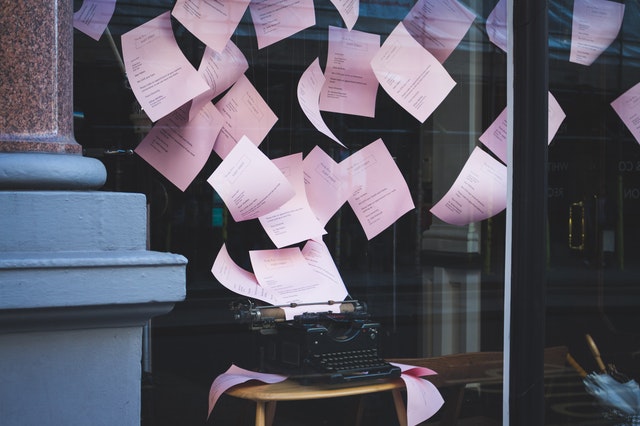
I know we're all writers here, but I want to talk about drawing for a moment.
Hand me a pen or pencil and a sheet of paper, then tell me to draw something. What would I draw? I'm no artist, but I might try to sketch out a house with the sun shining outside, or maybe a cat, or whatever is in front of me at the time.
Kinda boring, but it's where my mind goes. I'm almost 35 years old as I write this. I'll draw what I know. Safe stuff.
My five-year old loves to draw pictures. He draws every single day, without fail. Earlier this week, he handed me a picture he drew of a man flying through the air, arms outstretched, and a horn sticking out of his head.
"What's this?" I asked.
"It's a picture of you if you were a unicorn, Dad," he told me.
You tell me which one of us is more creative.
Adulthood and the death of creativity
Maybe "death" is too strong of a word, but I'm going to use it anyway.
When we're kids, we entertain every single possibility in our minds. Stuck in traffic? Maybe we should fly over the other cars. Don't know what to eat tonight? Let's have big bowls of ice cream with sprinkles. Need to reach something under the couch? We could just pick up the couch and throw it across the room!
As functioning adults, we can all glance at those scenarios and see what's "wrong" with them.
We can't fly over cars. Ice cream for dinner would wreck our digestive systems – and our evenings. It would be foolish to throw the couch across the room.
(Although come on: we've all wanted ice cream for dinner.)
We've spent years qualifying our ideas. Whether we realize it or not, we stay one step ahead of our brains, constantly editing out the bad ideas in the name of "being realistic."
The result? We shut down ideas before they develop.
That's why it seems like children are so much more creative than we are. They haven't heard someone tell them "no" enough yet. They are free to play around with their thoughts. They laugh more. They draw wilder things. And they come up with solutions that you wouldn't dream of.
Are all the solutions going to work? Of course not. But they're coming up with ideas quicker than you are. And if you want to be a creative idea machine, you have to find a way to tap into that part of your brain once again.
The answer? Freewriting.
For the uninitiated, freewriting is the act of putting pen to paper (or fingers to keys) and writing as fast as you can, stream-of-consciousness-style, for a set period of time, without editing or pausing to think.

Why freewriting turns you into a childlike thinker once again
Whether you're stuck on a problem you can't solve or you are just dealing with the dreaded "writer's block," freewriting offers a powerful and effective way of unlocking the creativity that you've spent years beating into submission.
The key is to get around your conscious mind.
Your conscious mind is what is always ahead of your thinking. It's the one telling you why flying over cars or eating ice cream for dinner aren't options.
By freewriting, you develop the habit of outrunning your conscious mind. If you can't stop and edit what you're going to say, you're forced to start working with the first idea that comes to mind.
It pushes your active brain into a subordinate position, and that's where real creativity can flourish.
What types of problems can freewriting solve?
Here's the easy answer: anything.
No matter where you're stuck, freewriting for even ten minutes can be a complete game-changer. Here are a few situations where you can power through problems and get to real solutions – ones you may have never thought of before.
Stuck plot points
You've written yourself into a corner and you don't know how to get out of it. Instead of just taking the easy way out by changing your story entirely or using a cop-out (I'm looking at you, "It was all a dream!" writers...), set a timer for ten minutes and start writing every possible idea onto a sheet of paper. No idea is too ridiculous!
Idea generation
Need an article idea or struggling to come up with your next book? Here's a piece of advice: it is so much easier to come up with 100 ideas than to come up with one or two ideas. When you have 100 to work with, you can put down any unrealistic or bad idea instead of trying to find the "right" one. Sometimes, that freedom leads you to the right idea automatically.
Writer's block
This is the "start with the wrong word" piece of advice. If you don't know how to get to your story, start in the wrong place. Work your way up to it. Set a timer and start anywhere. You'll find your groove, and then you can delete all the garbage that came before it. If your story has to start somewhere exciting, then have your main character start when he's brushing his teeth before work. The "delete" key exists for a reason.
Mental stresses
This is more personal, but even more effective. If something is stressing you out because you don't know how to solve it, freewriting your way through your emotions can be incredible. It's one of the main reasons I use freewriting in my everyday life.
Self-criticisms
Often, the one thing stopping you is yourself. Take a criticism, like "I'm bad at poetry," and start unpacking it. Where did that come from? Why is it true? Why is it false? How can you improve? Work your way through the criticism until you feel better about yourself. It works.
How to freewrite through any problem
So you're convinced of the power of freewriting. Good for you! You'll be surprised at how life-changing it is – and in the world of the internet where everything is "amazing," I mean that without hyperbole.
But how do you even do it? That's the beauty: you can do it however you want. But here are a few guidelines to help you.
First, decide on your medium. Some swear by the power of handwriting. I get it, and sometimes that is the best way to do it for myself. But I generally use a Google Doc. I type really fast and I find it's more effective at getting me to outrun my brain, which is the point. Also, I'm a lefty, so I'm much more comfortable typing. The correct answer is, "Whichever medium you are actually going to use."
Then, set your goal. It could be 1,000 words or ten minutes of writing. Whatever you like.
Now, go. That's it. Start writing until you reach your goal. Do not stop until you are done. No time to think, no time to react, no time to edit. If your fingers aren't moving and words aren't being vomited onto the page, then you're not freewriting.
Don't know what to write? Then literally start with, "I don't know what to write here. This is stupid. I've never believed in this sort of thing..." Let your brain talk without stopping. You'll find it. I promise.
If you're used to editing as you write (guilty!), then you'll find yourself putting up roadblocks between yourself and your freewriting.
Make it easy on yourself
There's no sense in viewing freewriting as a hard thing. It's actually the easiest thing in the world to do. But it's easy to complicate it, and that's what makes it difficult sometimes.
If you find yourself overthinking it, or you just can't get past the blank page, here are some tips to follow:
- "Try easy". This is the best advice I can give you. I found it first in The Accidental Genius, and another version is in Tim Ferriss's Tribe of Mentors. "What would this look like if it were easy?" Answering that question might be all you need.
- Ten minutes vs. an hour. If you're like me, you think, "If I can solve this problem in 10 minutes, imagine what I could solve in a whole hour!" Yes, there is power in freewriting for an hour. But if you're not used to it, you're going to hurt yourself. That's like saying, "I feel good after running one mile, I bet I'd feel great after ten miles!" I mean, yeah, if you're used to running ten miles. But if you're not in that kind of shape, you're going to get injured – and you won't finish.
- Start with the questions you have. Instead of trying to answer and solve all your problems, start by writing out every possible question you need to answer. That is often a great launching pad, because you take the pressure off your brain to remember every question.
- Start with a terrible place to start and ease into it. Like the "start anywhere" advice when you're writing fiction. If you get stuck in traffic every day, start with "put wings on my car and fly over the traffic". Is it ridiculous? Yes. But you're training your brain to think outside the box. You're not trying to solve it immediately. You're trying to get to the solution. Wade through the ridiculous first.
- Start with a boatload of bad ideas. Similar to the above point. Many great ideas are in the middle of bad ideas. Here, I'll walk through one right now. I need to come up with a murder for my next book. The first idea that is popping into my head as I write this, because I'm sitting at a laptop, is, "Somebody gets beaten to death by their own Chromebook." That's a terrible idea. But now I'm thinking about murders and computers. How about "someone's death is live-streamed by an unknown assailant"? That's not bad. And maybe the victim is a popular internet celebrity. The killer is one of their followers who is obsessed with them. Now I've got a start that I can work with and massage into a good idea. I know I can't prove this, but 90 seconds ago, I did not have this idea in my brain. But I started with a bad idea first. See how well that works?
- Maybe start with a prompt. Some people swear by writing prompts. I sometimes like them. And maybe that can work for you. I can't answer that. What I will say is, try it without a prompt first, and then go from there.
If you want to learn more about the power of freewriting, I highly recommend Accidental Genius by Mark Levy. I first read this book a decade ago and I credit it for most of my business and creative success since then. I re-read it every couple of years as a refresher, and it really goes into why freewriting works, and the different ways you can use this tool in your life and your work.
Then, you won't have to wait around for ideas to develop. You'll have them at your fingertips, and you can get back to writing.

